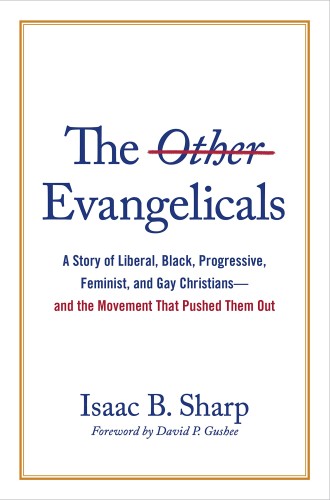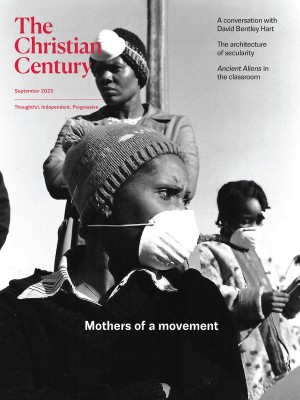The gates of evangelicalism
Isaac Sharp traces the story of the groups that find themselves outside, pushed there by the conservative White men standing guard.
I could hear the piano playing and people singing—especially the majority-male voices that were louder and carried farther than the female ones. As a newly employed assistant professor of religion, I was at my first all-faculty retreat. I’d taken a chance on this evangelical university because it had a Quaker connection, and I hoped the egalitarian Quaker impulse would neutralize the patriarchal and sexist aspects that thread through evangelicalism. Eager to belong, I found a seat, picking up the song sheet as I began to sing.
And then my heart sank. The lyrics were laden with masculine language. The full force of 21st-century evangelicalism’s marginalizing deftness, a determination to keep people and ideas that challenge the status quo at arm’s length, landed squarely on my shoulders. It was a weight I carried not only through the refrain of “This is my father’s world” but indeed throughout my tenure there.
Read our latest issue or browse back issues.
In hindsight, my experience at George Fox University is a microcosm of the astute analysis Isaac Sharp provides in The Other Evangelicals. Sharp, who currently teaches at Union Theological Seminary in New York City, provides a compelling story of evangelical gatekeepers—conservative White men who used (and continue to use) their power to restrict to the margins anyone who challenges their conservative White male identity.
Much like revised interpretations of Christianity understand its origins as diverse, with multiple threads rather than one, Sharp’s telling of the story of American evangelicalism takes into account multiple people and groups who have claimed the evangelical label. Like those scholars who speak of multiple Christianities, Sharp makes a case for recognizing evangelicalism’s multiple expressions, even as insider leaders don’t. After presenting a historiography of evangelicalism, Sharp devotes the remainder of the book to tracing various marginalized groups, noting the commonality they share: by the end of the story, they find themselves on the outside, having been pushed there by the conservative White men who marshal their power successfully.
Sharp’s advice, given at the end of his extensive introduction, is clear: “Anyone looking for a more capacious and theologically nuanced, or less sectarian, homogenous, and insular kind of faith would do best to look beyond the heavily guarded evangelical gates.”
Each chapter begins with an overview of the accepted historical narrative of a group that has been pushed out: the liberals, the Black evangelicals, the progressives, the feminists, the gay evangelicals. Sharp then moves into a more nuanced examination of that group and its individual figures who challenged the evangelical norms.
For those wanting to know more, for example, about the work of Black ministers like Howard O. Jones, William H. Bentley, William Pannell, or Tom Skinner, Sharp provides biographical information for each figure as well as the specifics of how each “reminded white evangelicals that not all evangelicals were white.” He goes on to show a continuing pattern: Black evangelicals are welcomed into the fold based upon their theology; once inside, they begin to feel disconnected and misunderstood; finally, they become worn out and fed up, forced to leave in a self-preservation effort. Sharp demonstrates through the stories of these individuals that the only way for a Black evangelical to remain in the fold is to think like a White man.
As the story unfolds, Sharp reveals a world in which one’s bona fides are increasingly defined as over and against: conservative theology over and against liberal theology, inerrancy over and against higher biblical criticism, status quo White culture over and against understandings of race and structures of oppression, voting Republican over and against supporting Democrats or independent leaders, women as designed for “biblical” roles over and against women as self-proclaimed feminists, and so on.
And of course it is men who consistently hold the power. Sharp explores how three women—Letha Dawson Scanzoni, Nancy A. Hardesty, and Virginia Ramey Mollenkott—opened up the conservative Christian world to a fuller understanding of gender equality. However, the movement they energized met an obstacle that ultimately forced a split, leaving both sides smaller, weaker, and unable to break through the evangelical glass ceiling.
The issue, on the surface, was LGBTQ inclusion and understanding, though the irreconcilable difference underneath was the authority and interpretation of the Bible. Scanzoni and Mollenkott had tried to persuade the Christian reader that “the homosexual is one’s neighbor” in their 1978 book, Is the Homosexual My Neighbor? Their arguments ultimately were unpersuasive to those who believed the authority of scripture means there’s only room in the evangelical tent for interpretations that start and end with “love the sinner, hate the sin.”
In the book’s final chapter, Sharp asks if evangelicalism is in an identity crisis. His answer is yes and no. “By the dawn of the twenty-first century,” Sharp explains, “the most evangelically acceptable version of US American evangelical identity, for instance, was someone who believed like an antimodernist antiliberal inerrantist, thought like an antifeminist antigay complementarian, and voted like a white Republican.” But not all evangelicals see this as a crisis. While the recent association of evangelicals with former president Donald Trump has caused considerable consternation among some, many continue to be loyal to him and don’t appear to see competing convictions between their faith and White nationalism.
Sharp’s interpretive lens on the gatekeepers and the turns they’ve used to keep power centrally located is sure to become a widely accepted part of the story of American evangelicalism in the late 20th and 21st centuries. He offers clear analysis and provides a compelling portrait of a movement that even while being extraordinarily difficult to define nevertheless has been strikingly adept at defining who is in and out.
After the manuscript for The Other Evangelicals was completed but before the book went to press, Sharp wrote a blog post about the expulsion of Beth Moore, who was an international powerhouse for evangelical women. A longtime member of the Southern Baptist Convention, Moore crossed the line in the sand when she outed powerful male leaders for their sexism, nationalism, and Trumpism. In return, she was labeled as woke and a heretic. Addressing Moore’s meteoric fall from evangelical grace, Sharp writes, “Beloved icon one day. Pariah the next. Insider today. Outsider tomorrow. It’s a surprisingly common story.”
Perhaps Sharp’s keen analysis will encourage further study of those at the margins. One group that comes to mind is those without official platforms who market evangelical messages to children and teenagers through social media, homeschooling, Christian popular culture, Sunday worship settings, and sermons. Ideally, examinations like Sharp’s will make it to everyday evangelicals who seek to understand their faith and its context more fully. As for mainliners looking in, they might take the opportunity to consider the ways their own traditions keep certain groups safely at arm’s length. There is always enough plank to go around.






